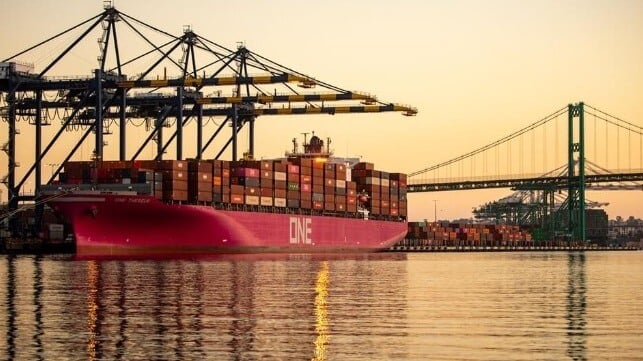ILWU Slams White House's Tariffs

The International Longshore and Warehouse Union (ILWU) has come out swinging in opposition to the White House's recently-imposed tariffs on foreign goods. ILWU members work at the main container ports on the U.S. West Coast, and the volume of arriving import cargo is set to plummet because of the cost effects of the administration's 145 percent tariff on Chinese goods.
In a statement, the ILWU said that it expects to see massive job losses as a result of the tariffs. "These tariffs are nothing more than a direct attack on the working class and should be opposed outright," the union said.
Carriers have already begun to blank sailings in expectation that future demand for ex-China shipping routes will be reduced by the steep tariffs. Hapag Lloyed has reported a 30 percent cancellation rate for shipments out of China, and Bloomberg reports that the number of boxships en route from China to the U.S. is down by about 40 percent since the tariff announcement in early April. Some amount of substitution is expected as importers find new supply chain alternatives in Southeast Asia, but some products may become hard to find on store shelves, retailers have cautioned.
The ILWU warned that scarcity and inflation will impose a new burden on working families, citing estimates of a baseline cost of living increase of about $1600 per household per year. "We refuse to accept policies that destroy jobs, inflate costs, and sell out the working class," said ILWU.
The tariffs depend on the White House's negotiating process, and could change at any time. The administration has already rolled back tariffs for electronics and semiconductors, reducing the levy for these key categories to ____. It is also reportedly finalizing a plan to cut the total effective rate on foreign car parts, which are essential for U.S. automotive manufacturers.

that matters most
Get the latest maritime news delivered to your inbox daily.
China has retaliated with tariffs of 125 percent on U.S. goods, along with a de facto suspension of heavy rare earth element exports. It is pressing the White House for substantial (or total) tariff relief as a precondition for talks. Beijing insists that there is no ongoing negotiation, despite the president's recent claims of high-level phone calls and meetings.
"As far as I know, there have not been any calls between the two presidents recently," said Chinese Foreign Ministry spokesperson Guo Jiakun. "If a negotiated solution is truly what the U.S. wants, it should stop threatening and blackmailing China, and seek dialogue based on equality, respect and mutual benefit."
